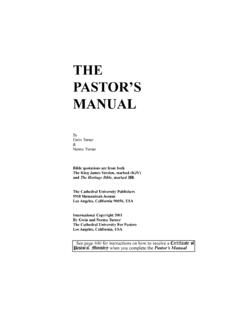Transcription of Meditations on Communion
1 Meditations ON THE lord S SUPPERDO NOT BE INFLUENCED BY THE IMPORTANCE OF THE WRITER, AND WHETHER HIS LEARNING BE GREAT OR SMALL, BUT LET THE LOVE OF PURE TRUTH DRAW YOU TO READ. DO NOT INQUIRE, WHO SAID THIS? BUT PAY ATTEN-TION TO WHAT IS SAID. MEN PASS AWAY, BUT THE WORD OF THE lord ENDURES FOREVER. - THOMAS KEMPIS THE IMITATION OF CHRISTON CELEBRATIONS (January 5) New Year s Eve and New Year s Day are traditional times of celebration for us. Have you ever thought what the word celebrate means? We always want to celebrate with a crowd of people -- usually friends and acquaintances. Celebrating by yourself just doesn t seem to have the same feeling. We need a reason to celebrate. We celebrate the start of the year; we celebrate birthdays, anniversaries, holidays that roll around once a year -- but always, there is a reason for our celebration.
2 It s most common that the reason looks to the past -- such as birthdays or anniversaries, or national holidays. Even New Year s Eve, with its resolutions for the coming year, shows old Father Time on the way out as well as Baby Time coming in. Sometimes we celebrate a person, rather than an event. Memorial Day is for veterans; La-bor Day for workers; Valentine s Day for lovers -- and St. Patrick s day for anyone who can recognize the color green. Nobody celebrates with a diet. The diet starts January 2nd, not New Year s Day. Food and drink -- often too much food and drink -- are a very real part of a celebration. Finally, a celebration is a happy time -- even a joyous one. The Fourth of July may have its solemn moments of remembrance -- but it must have fireworks. We use that same word, celebrate , to mean that we are taking the lord s supper .
3 We often speak in our public worship of celebrating Communion . When I first thought about that, my reaction was, a completely different meaning of the word. But think about it: We celebrate the lord s supper in a group. It may be a small group, even as small as two people, but a group is required. How many do you need for an anniversary? Do we celebrate for a reason? The greatest reason in the world: Jesus, the Messiah, died on a cross that we might have eternal life. If eternal life is not worth celebrating, then nothing is. That reason looks to the past, just like our other celebrations -- to the hill at Calvary. It is a greater celebration in that it also looks to the present, as we examine ourselves. It is greater yet, for it looks to the future -- when He returns. Some celebrations are for events; some are for persons; ours is for both.
4 It is the celebra-tion both of the Crucifixion and the Crucified. Surprisingly enough, even this most sacred of celebrations must be done with food and drink. In its roots, the Passover, it was referred to as the Feast. Other celebrations fatten the body; this one feeds the soul. So then, when you take it today, do not neglect its solemn aspect -- but remember, this is a celebration. Take, eat -- with joy. DIAMOND IN THE SINK (January 12) My wife is not a woman given to water power. She does not go into tears over the minor up-sets of life. She is not one of those women who use tears as a weapon to get what she wants. When she cries, she means it. When she cries, I pay attention. So you can imagine that I was extremely concerned when I came home one day to find her hov-ering over our kitchen sink, bawling her eyes out.
5 She was clearly crying over something in the sink, and it wasn t onions. It took some time for me to get her sufficiently calmed to find out what happened. She was crying because she had lost the diamond out of her engagement ring. It s interesting to see the difference in our reactions. My first thought was, You ve got to be kidding? (If you knew how little that diamond cost -- and it was the biggest one I could afford at the time -- you d understand my first reaction). To me, it was a relatively inexpensive gemstone. To her, however, it represented her marriage. She had lost the symbol of something which (she tells me) makes her happy. I began to think about it in a different light. Isn t it interesting that the deepest form of communication in our species is symbolic communi-cation? It is the least precise form of communication, to be sure, because its meaning depends both on the one talking and the one listening.
6 For example, when I see an American flag -- a symbol -- it carries deep meaning to me. For many of you it does also, but the meaning is somewhat different. Yet we refer to these meanings by the same symbol. The communication is not complete in what I say when I show the flag; it needs your experience to be complete communication. To my wife, that ring was symbolic communication from me to her, and it was very precious. That s symbolic communication. It needs a symbol, like the engagement ring. It needs a sender, but it is not complete without the experience of the receiver. The deeper the experience on both sides, the more meaningful the communication. It s important to see that symbolic communication is used where the message involves the total life of those doing the communicating.
7 Such a communication is found in the lord s supper . The bread and the cup are symbols. Simple things; like a ring, or a flag, yet these are packed with meaning. They represent the body and blood of our lord . As such, we see that Jesus committed his whole life into those symbols. He has made this communication as deep as it can possibly be. But the communication is not complete without our lives. If we ve never seen the flag before, it means nothing. If we choose to ignore the wedding ring, the communication is rejected. But if we commit our whole lives to Christ, the symbols take on the deepest of meaning for us. They become, symbolically, the very body and blood of Christ. They become our salvation; they be-come the promise of resurrection. And they are very precious indeed.
8 BY WHAT AUTHORITY? (January 19) (Mat 26:28 NIV) This is my blood of the covenant, which is poured out for many for the for-giveness of sins. It is an interesting thing that Jesus Christ went around in his earthly ministry saying, Your sins are forgiven. We don t think of it this way, but this is an extremely presumptuous statement -- one of the many radical things Jesus said in such a humble way. Perhaps you don t think so; look at it this way: Suppose that I decide that you need a good punch in the nose. Being a man of action (and rather limited sense) I decide to carry out this plan, and I bop you in the face. You (being a su-perb Christian) now have the Christian privilege of granting me forgiveness. Let us suppose, however, that Satan arises and tempts you to petty vengeance, namely, you decide to bop me in the nose.
9 The fight seems to be on, but (let us further suppose) that Graydon Jessup steps be-tween us. He directs you to cease and desist, because, he says, I have forgiven him. Now, being the logical sort of person you are, and greatly given to debate as opposed to com-bat, you decide to reason with Graydon. Hold on, preacher, you say, if I want to punch his lights out (in a decent Christian manner, of course), why, that s my business. What right do you have to forgive him and let him off the hook? You see the argument, of course. You have the right to forgive, because you re the one I punched in the nose. I didn t punch Graydon, so he doesn t have the right to forgive me on your behalf. Right? To turn this into a principle, only the person who is offended has the privi-lege of forgiving.
10 But hold on. In any such dispute, there are always at least two persons who are offended. In this instance you are one. The lord God Almighty is the other, for he has ordained peace among his children. When I punch you in the nose, you bleed and He is pained. He who set the moral order of the universe is always offended when it is violated. And that doesn t count how He feels about someone punching his children (how do you feel when someone hits your chil-dren?) Now you see why Jesus so enraged the Pharisees -- when he claimed to forgive sins, he claimed to be God. His entire purpose in coming to us was just that: to rescue us from our sins, to grant us salvation. Vengeance is cheap, and therefore is commonly sought and sold. Forgiveness, however, is costly; the more there is to forgive, the greater the pain of forgiving.








